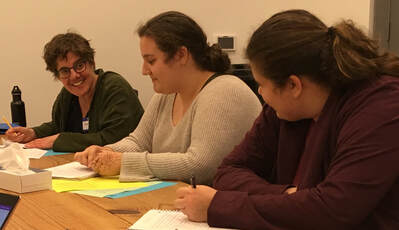 Peggy and two of the brilliant teen writers at BAMPFA, Spring 2019 Peggy and two of the brilliant teen writers at BAMPFA, Spring 2019 I love working with teenagers because I learn from them. And it's fun! I started working with teens in 1995, with the ATD Fourth World Movement in a vacation house for poor families outside of London. Teens said, "No one is working with us. Will you work with us?" I said, "Sure!" having no idea that I was making a career choice. One of those teens, Bea, and I continued to work together for several years within the youth branch of ATD Fourth World and she continued to work with teenagers well after she no longer was a teen herself. Bea and her mother, Moraene, both work as anti-poverty activists, as experts with first-hand experience of poverty. When I recently saw Moraene, at a conference in France, she introduced me to one of her colleagues: "Bea might have gone down a dangerous path if she hadn't met Peggy when she did." Youth workers often don't know the effect we really have, so that was wonderful to hear. But what was remarkable for me is that it's thanks to Bea that I've been working with teenagers, and loving it, for 24 years. Bea and I changed each other's lives, and those are my favorite stories. 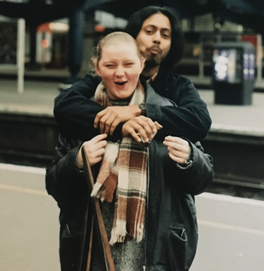 Bea and Meraz 1995 Bea and Meraz 1995 Teenaged Bea showed me around her Hackney neighborhood, told me stories about her life, introduced me to her friends, answered my questions and helped me figure out how to work with teens. She began my understanding of the struggles many teens face that I never had to face, but also of the strength, creativity and profound sense of justice that teens can bring to that struggle. After London, I spent four years working at the international center of the ATD Fourth World Youth Movement, outside of Paris. The Youth Movement brings young people from very different backgrounds together, as equals, in social justice, anti-poverty projects. I was working with young people from different countries, with different first languages, with widely varying formal education and literacy levels and facing very different kinds of challenges. There was Richard who lived with his Roma ("gypsy" or "traveller") community in a camp with no running water outside of Paris; Luke, who was going to University in Berlin who had had family on both sides of the wall; Marie who was learning circus arts to entertain children in hospitals in Brussels; and so many more. We brought them together very carefully and intentionally with a methodology that has been developed over decades and is now called Merging Knowledge. But even with this methodology and other techniques such as Theater of the Oppressed, and our purposeful facilitation, much of which I recognized later in "Restorative Justice" practices, I was consistently impressed with the capacity of these very, very different young people to overcome the barriers between them to fight for justice for all youth. That capacity gets dimmed as we grow older and I knew I had a lot to learn from it. This knowledge, of how much there is to learn from bringing very different youth together, was solidified after a group of Slovakian, French and Belgian youth I was leading on study trip in Bratislava was attacked by skinheads on a public bus. This is a story for another time, and one I have written over and over without ever being satisfied [we all have those stories]. But the most important part of the story, for me, was the incredible way the young people, who had not had an easy week, came together and supported each other in the days after the attack. In 2002, I moved back to the States, very much motivated by the desire to learn from young people in my own country like I had been learning from youth in Europe. While waiting in France for visas to come through for my French husband whom I had met in the Youth Movement, I put together a data base of youth-serving organizations in the San Francisco Bay Area. When we finally settled in San Francisco, we both found very interesting jobs in youth organizations and we were both shocked by how youth from "disadvantaged" backgrounds were being treated. The bar was consistently being lowered for them. Staff were condescending and preachy. And no one seemed interested in learning from the youth themselves. We had been trained to keep the bar high for all youth, knowing every youth would need different kinds of support to get there. We'd learned to be patient and persistent, creative and team-focused. Most importantly, we'd learned to listen to the youth themselves, as the experts on their own lives. My (now-ex) husband (and still best friend) eventually gave up on American non-profits which are overly guided by grant cycles and which put so much financial investment into executives who, especially at that time, seemed so far away from the lives of the youth they were meant to be serving. 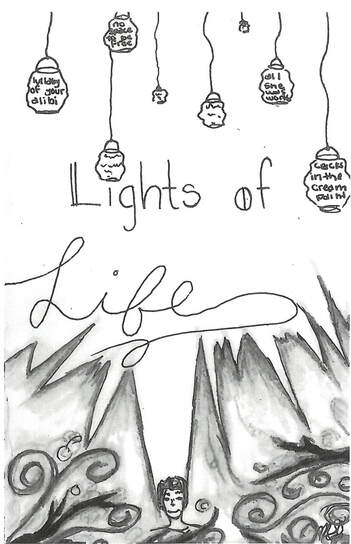 Teens made a zine at the end of the workshops at Berkeley Public Library, Summer 2019 Teens made a zine at the end of the workshops at Berkeley Public Library, Summer 2019 Eventually I found two organizations and one new methodology that would allow me to work with youth in a way I believed in outside ATD Fourth World: The Beat Within, The Oakland Public Library, and the Amherst Writers and Artists (AWA) writing workshop method. I've been volunteering with The Beat for eleven years in the local juvenile hall, and for the last year in San Quentin State Prison. The purpose of The Beat is to get the experience, thoughts and creativity of youth, especially incarcerated youth, out into the world through writing workshops and a magazine. The public library, for which I've worked, mostly part-time, for over ten years, is all about seeing the full complete person in front of you, finding answers to their questions, and being a gateway to knowledge sources and community they might not find elsewhere. The AWA method sees every person as a creative person and sees brilliance as being rooted in one being true to oneself. I've been using AWA in Green Windows workshops since 2008. Through all these jobs, bits and pieces of work cobbled together to almost make a living in the Bay Area, I have learned a lot from young people in my community. The boys killed on the street in the "bad" parts of my town (parts I live and work in, happily) aren't just boys, they are our boys. I know the shooters and the shot and know choices they face and choices they do not have. Thanks to The Beat, I know a lot of their hopes and loves and dreams and I've seen those turn to despair when their future is no longer imaginable. I bring these hopes and these despairs into everything I do and they make up one basis of my understanding of my community. I am not the same person when, for example, on the same day, I hear news that a 24 year old I've known since he was 15 got his sentenced reduced from 84-years-to-life to 2 more years in the state juvenile facility and news that another, age 19, a youth worker himself, was shot and killed sitting in his car with his girlfriend. I don't want to not know this. I want to know these young people and I want all my decisions to be affected by these events, these youth, these victories and these losses. Thanks to working with the Oakland Youth Poet Laureate program for the library, I get to listen to youth speak out on race, gender and justice in ways that my generation cannot manage with such articulation and honesty and respect. And being able to witness teen writers support each other in Green Windows workshops has taught me about listening, about imagination, and about what being true to oneself means today in ways that deepen my trust in the future of our society, if these youth can continue to be themselves and be safe. Today's youth give me hope. Not because they are simply the future, nor because of their own hope. Youth give me hope because they are brilliant, because I can see social progress made within them, because I have so much to learn from them, which means my own life is still evolving. We need to support them, trust them, believe in them, but not step back, not give over. As an adult, I want to continue to listen, to learn and to then see how I, with the wisdom and skills I've gained over fifty years, can help. Let me know if you, too, want to help. And I truly do simply enjoy the company of teenagers. And I am deeply grateful to be doing work I love. - Peggy Simmons PS -if the skills and experience I've gained working with teens over the years could be of use to your group - of adult or youth - please let me know!
4 Comments
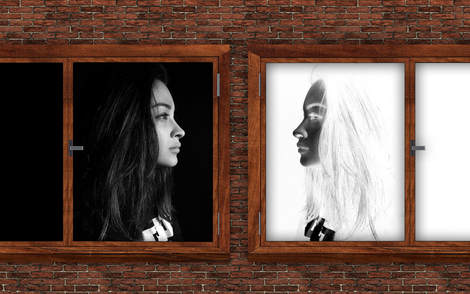 I thought it was time again to share some of the work I’m doing in the local juvenile hall (Alameda County Juvenile Justice Center). For the last nine years, I’ve volunteered with the magazine The Beat Within doing weekly writing workshops in the hall and editing the writing for publication. I also facilitate a 5-week poetry workshop once a year in an English class in the hall for the Oakland Public Library, leading up to the Oakland Youth Poet Laureate application deadline (February 5th this year!). With Green Windows, I’m now regularly facilitating a weekly writing workshop with youth in the hall who have graduated from high school. Traditionally, these youth do nothing while their peers are in class. Probation staff in the hall took it upon themselves to organize classes for them: Anger Management, Financial Literacy, Gardening, Sex Ed, Chorus, whatever a staff can offer. You can read more about this program in this blog post from last June. These writing workshops, all of them, have gotten harder over time. I’m not sure why but I have two thoughts: 1) There seems to be more kids who have a really hard time maintaining focus. And the amount of time they can focus is less and less with more and more kids who seem to not ever focus at all. 2) The discipline in the hall has gotten more lenient, which in a big way is a good thing. But it means the kids can go through a whole program and/or a whole class talking to each other loudly, not working, without any consequence or reaction. I have no authority, so I try to convince, cajole, reward, adapt the work to the individual and sometimes guilt-trip by telling them why I am there. I am there to get their own thoughts and imagination on paper. And I am disappointed when I don’t, because it's a loss for me and for the world that might read them. But just being there matters. Even the most recalcitrant writers ask me when I’m coming back. They thank me in the end for “helping me express myself.” They’ll chat with each other about their cases and gossip about their girlfriends through the whole workshop and then tell me that the workshop will help them be creative and control themselves in their future. All of this can happen and be true. I am always drawn back to the idea that just being there, regularly, even relentlessly, and determinedly demanding of them to be their true selves on paper counts. Who do they count on to show up? Who is asking them to be true to themselves? I’d like to tell you about the young people I get to meet. Here, now, I’ll tell you about two very different people. Kalani has focus and tries almost every time, almost every prompt I give him. He can write short, powerful pieces that make the reader understand a little better what it feels like to be an incarcerated young man facing an uncertain future. He also has a remarkable imagination, able to create both characters and settings that go well beyond his personal experiences. The themes in his fiction, though, are always about family bonds and trying to care for family amidst scarcity, violence and addiction. He has written about the challenges facing a boy simply coming home after school and about a man hunting in the wilderness to get food for his family. Strong bonds between brothers reoccur in his fiction. In all the years I’ve been doing writing workshops in the Alameda hall, I have met few young people with this versatility of talent or this willingness to do real, challenging work. A judge (not a prosecutor, thanks to California Proposition 57), recently decided to put Kalani back in juvenile court, to not try him as an adult and send him to adult prison. This is a victory. I do not know why Kalani is locked-up, though I know it’s serious. I never ask. These young people are not their crimes. Kalani is intelligent, creative, thoughtful, and kind. He prioritizes his family and he tries new things to better himself and broaden his world. Why would I need to know more? Nia is 18 and has been told for months that she’ll be sent to a group home soon. She wants to go home. Why any of that needs to happen when she’s a legal adult, I don’t know. Group homes lie about interviewing her when they haven’t. She is angry. I would be angry too. She is in a class full of young men who miss their girlfriends. She’s a young woman who is easily charming and easily charmed but clearly she draws bold lines around herself. Nia is quick and clever and wants books and poetry with language that doesn’t bore her. She is a clear and precise writer and writes quickly. Every day she’s not in the mood to write, and almost every day she does anyway. One day she said that she was too angry to write. I said, “Write out your anger, don’t hold back, don’t worry about being appropriate, you don’t have to show it to me or anyone.” She did and said she felt better afterwards. In her evaluation she wrote, “I learned that writing down my feelings really does help me cope with my time.” Please feel free to reach out to me with any questions about this work, or if you'd like to volunteer with The Beat Within. Below, you ‘ll find two pieces of writing from Kalani, one from Nia and a piece I wrote in one of these workshops last Fall. - Peggy Simmons Scared
I’m scared because I don’t know what to do I’m scared because I only have 1 life not 2 I’m scared because they offered me more time than I lived I’m scared because I have no control in life I’m scared because I can’t trust no one I’m scared because the ones you love will hurt you I’m scared because no one looking out for lil’ bro I’m scared because I’m not living at home -Kalani The Room The room I was in was small fit about 5 people at most But the room had AC so it was never hot inside. I remember this room because most of my teachers wanted me in detention instead of being in their class. The room walls were all beige with desks all facing the wall. -Kalani 18th B-Day So 2 days ago I spent my 18th b-day in a jail cell. Ever since I turned 13 I always dreamed about my 18th B-Day and how I would have the sexiest dress on with the baddest heels. The longest red hair and makeup to die for. My 18th b-day was supposed to be the happiest day for me. Instead, once I woke up I had to stand in a door and wait for somebody to pop my door. I had to sweep, wipe, and mop down my cell. I was being talked at rather than talked to. I never imagined I would spend the best day of my life in a jail cell. - NiMoney I Want Your Expressions I want your words to come from your bellies I want your words to come out colorful and complex I want your words to shatter your shells So we can really see you We need to really see you I want your words to hit us in the gut I want your words to show us new lights I want your words to shatter our blinders So we can really see you We want to really see you We are stuck, each of us, between walls Walls built between people, between neighborhoods We can’t see each other We pretend the world is the world within our walls We live small. We live blind. We live selfish. Tend our gardens and ignore the smoke on the other side. I want your words, I want our words to explode the walls So we can see each other. - Peggy Simmons, (Written in the last Fall 2017 workshop in the Alameda County Juvenile Justice Center SEEP workshop.) 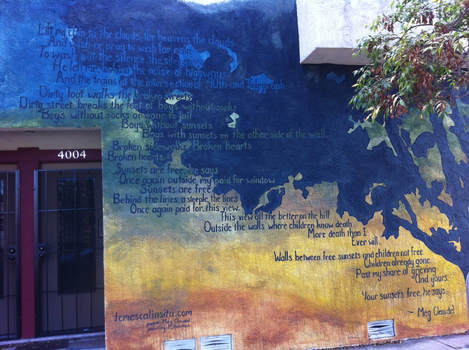 Mural by Kristi Holohan on Opal St at 40th in Oakland. Mural by Kristi Holohan on Opal St at 40th in Oakland. (Originally posted on peggysimmons.net, May 11, 2009. I still volunteer weekly with The Beat Within. I've learned a lot and keep on learning.) I volunteer with The Beat Within once a week, helping to facilitate their writing workshops in Alameda County's juvenile hall. I love it. I am inspired by the youth, the facilitators and many of the hall's staff. Experiences like this are an important reality check for me - reminding me of how much I don't know and don't understand and giving me opportunities to learn. Two things have especially struck me in recent weeks from workshops in the hall. Firstly, in a discussion about what life on the streets costs (for issue 14.21) one young man said something like, "Everyone tells us to get off the streets. Get off the streets and go where?" The next week another young man wrote a great rap about being stuck in the "hood life" in which he mentions boys who have no socks to wear. (Marky Bo, page 26 of issue 14.22) I haven't been able to follow up with the young man who said, "Get off the streets and go where?" So I don't know exactly what he meant. He might have meant, "with five kids in a 1 bedroom apartment, where else could we hang out but on the street?" And/or he could have meant that he and his peers see no other future for themselves, no other way of life but hustling on the streets. Because they have no example of other choices? Because they've been brought to believe it's all they are good for? Because the harsh circumstances of their childhood - home, health, education, violence, family - meant that nothing was built upon what was already a weak foundation? Like the shame and discomfort of going to school without socks. All or none or parts of these things might be true. But it doesn't matter what is true or what is not true, what is right or not right. If he believes there is no other life for him, how do we show him otherwise? How to we make it otherwise? And how can I better understand what choices these youth think they have and actually have? How can I see better from their point of view? And how can I share what I learn with others who think of those kids as just criminals who stupidly make bad choices and should be punished accordingly, period? Hearing and reading the writing of these youth, while reading and listening to lots of mainstream journalism too, reminds me of how most of us go through our days looking at the world from inside our own little bubbles. And judging from within them. We interpret what we see completely differently than other people from their own bubbles. And most of us, if not all, just can't see widely enough to judge others fairly. My work and my life are all about trying to find ways to pop, or at least widen, these bubbles. At least my own. I thank The Beat Within and the youth in the hall for helping me try. Free Sunset
by Meg Claudel Lift my chin to the clouds, the heavens, the clouds And wish or pray to wish for rain To wash out the silence, the silence He left me, behind the noise of highways And trains at the intersection of 40th and Telegraph. Dirty foot walks the broken streets Dirty street breaks the feet of boys without socks Boys without socks or gone to jail: Boys without sunsets. Boys with sunsets on the other side of the wall. Broken sidewalks. Broken hearts. Broken hearts. Sunsets are free, he says Once again outside my paid-for window Sunsets are free Behind the lines, a steeple, the lines Once again paid for, this view This view all the better on the hill Outside the walls where children know death More death than I Ever will. Walls between free sunsets and children not free Children already gone Past my share of grieving And yours. Your sunset's free, he says. ("Meg Claudel" is the pen name used by Peggy Simmons.) (This poem is in the mural on 40th St and Opal St, Oakland CA and was first drafted on June 22, 2009.) (These pieces are excerpts from the manuscript What I Want My Words to Do to You, a collection from seven years of Peggy's writing about facilitating workshops in juvenile hall plus writing from incarcerated youth from the same period.) 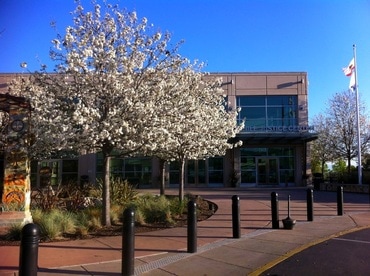 Alameda County Juvenile Justice Center Alameda County Juvenile Justice Center The Alameda County juvenile hall has an amazing pilot program for incarcerated youth who have graduated from high school, called SEEP (Student Extended Education Program). Traditionally, and apparently in most juvenile halls, there isn’t much for the graduates to do while their peers are in class. In the Alameda County hall, a small program was started in partnership with Merritt College to give some students college courses. This program runs on love and volunteers thanks to dedicated people like Amy Cheney (who Green Windows is honored to have on our Advisory Board and who used to be the Librarian in the hall) and Louise Anderson (Alameda County Juvenile Justice and Delinquency Prevention Commissioner [JJDPC]). Besides this small college program involving a few youth and a few volunteers, there was nothing for the graduates until some JIOs (Juvenile Institution Officers, the Alameda County Probation staff who work with the youth in the hall) decided to create a program. Officer Nicole Perales and Officer Brian Bingham (who also honors Green Windows on our Advisory Board) started SEEP, with no funding, engaging other JIOs to teach classes on life skills, debate, cooking, gardening, whatever skills they could share. They needed to rely on people who had clearance to enter the hall, a proven track record to work with the young people and who wouldn’t require funding. This fabulous, desperately needed program, was also born out of love and runs on dedication. Perales and Bingham have seen and supported my work in the juvenile hall over the years, running different kinds of writing workshops with Green Windows, for The Beat Within and with the Oakland Public Library for the Oakland Youth Poet Laureate program. They knew my love, dedication and clearance and asked me to run a series of creative writing workshops with the SEEP students. Thanks to generous individual donations to Green Windows, I was able to run this workshop for five weeks this past Spring. The creativity of these brilliant and charming young people impressed me, as did their desire to engage themselves while locked up, despite facing uncertain futures or futures certain to contain a lot of time inside and while dealing with all levels of sorrows. Their writing shows they do not easily lose hopes and dreams and loves. I hope to continue to offer creative writing workshops with these young people, in addition to volunteering weekly to run workshops with The Beat Within. Green Windows needs funding to offer them, though, please consider donating. This whole post was written to introduce this one piece of writing, written in the last SEEP workshop. Writing like this implores us to offer these young people as many opportunities as possible to authentically express themselves. Our society has much to learn and gain if they do. - Peggy Simmons Untitled
We were all born with the power of changing the world, emotionally, mentally, spiritually and maybe of course verbally. I stand tall on this lovely morning with my hands bruised from protecting myself from the haters, eyes red & puffy from praying and crying, my body slim but using the bit of strength within my female body. Nobody should be Judged from a record or a misunderstanding mistake. We are human beings, please look at us as one. If nobody wasn't born in different countries then what is a world? Different skin tones matter or what would be the real definition of a human being including their tone that comes out of their mouth? What’s coming out of mine are the last words I am ever going to preach for. They say, “what you do & say will be used against you”. In the system some can control themselves & get away, start over until never again. It is another day that can be brighter but Hey! What about the others “maybe”? Can you at least feed us real food here & there, take us to field trips in the “real life”? Or cook what I enjoy, for I think I still remember how to use my hands. Stress really eats up our cells and DNA including techniques, that nobody made him or me learn. Again they say “get it together this is real life”. Can I be loved one more time? Because that’s the “real life” not the system. 17 years young now. 5 years pass - I am free I could have spent the rest of my life in there, but I did not go down like no SUKKA, fight! Let your voice be heard & the victim get on the stand! I am loved, I started my own restaurant, I travel now. One day when I am 50, miniature me’s will be changing the world Amen. - Xochtil |
Categories
All
Archives
July 2020
|
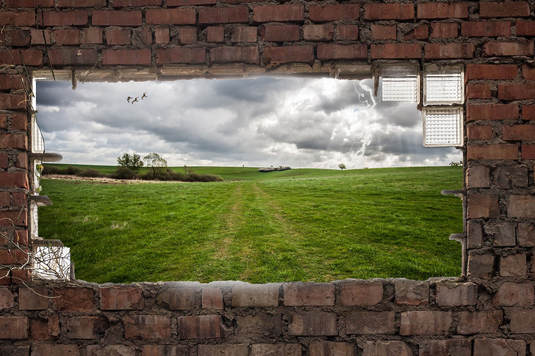
 RSS Feed
RSS Feed
